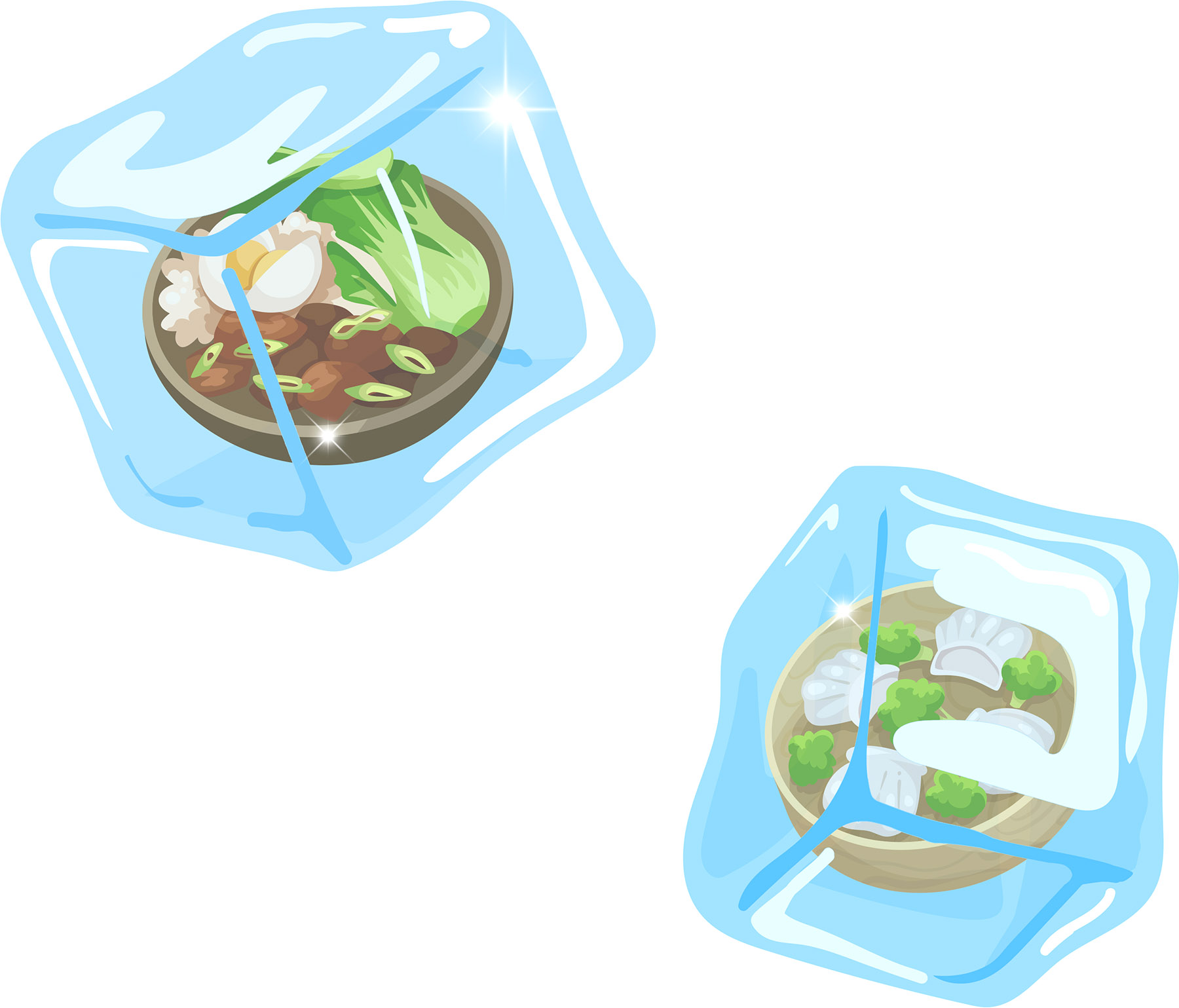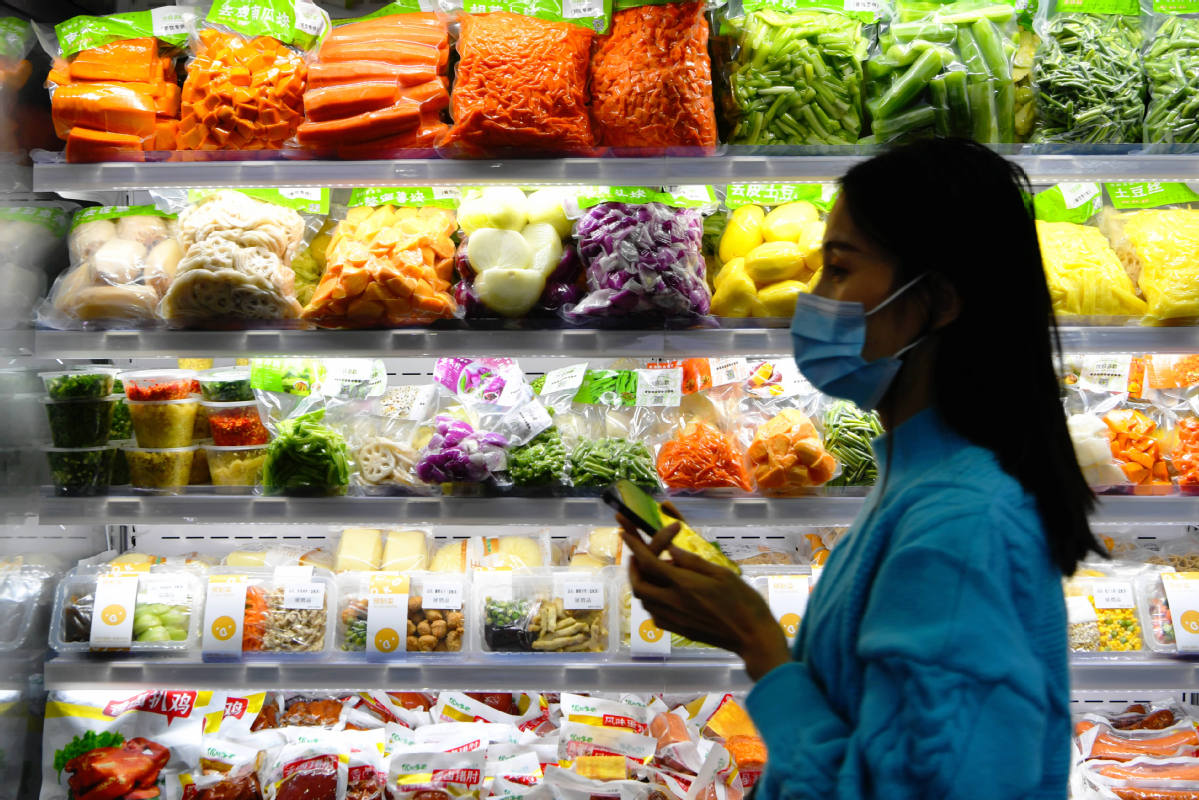More time-poor workers are preparing their food in advance for better nutrition, convenience

Every Sunday evening, as dusk settles over Shenzhen, Chen Jiamin blocks out the hum of the city outside her apartment window, and enters her kitchen with determined focus.
The 25-year-old, who works at a law firm in the Guangdong province metropolis, transforms her kitchen into a mini food production line.
She quickly unwraps a bulky parcel of food that covers a small cooking preparation table. The carefully selected ingredients include fresh chicken, lean beef and fish, as well as root vegetables like sweet potatoes and carrots, and leafy greens that she knows will freeze well.
Chen deftly picks off unwanted parts of the meat and vegetables, rinses the remains under tap water, and chops them into portions the right size for marinating with spices and sauces.
She turns on the stove and begins cooking in batches, pan-frying or roasting the meat until it is tender, and carefully sauteing the vegetables so they retain their nutrients and color.
Once everything is cooked, she divides the food into five equal portions, packs them in airtight containers, and stores each one in the freezer as a ready-to-eat meal.
"The whole process takes only a few hours, but rids me of the trouble of figuring out what to eat for lunch at work the following week," Chen said.
This weekly ritual has proved convenient and cost-effective, and ensures a well-balanced, homemade meal for Chen throughout the workweek.
"I love to cook, but never thought I'd cook in bulk," Chen said.
Chen is among a rising army of urban workers who are joining the ranks of dongmen, or frozen door, and are freeing themselves from the burden of preparing meals every day.
"Frozen" has become an online buzzword for preserving food, while "door" expresses opening a pathway to an easier lifestyle.
Preparing an entire week's worth of meals in one go, and then freezing and reheating them allows city workers to avoid the grind of cooking every day. The procedure saves time and allows them to enjoy homemade food. It also serves as a healthy alternative to takeout food, particularly for people with busy schedules.

Healthier, affordable
Cooking preprepared meals has evolved into a popular trend where people share recipes and tips for freezing dishes on social media and through online communities.
On the social media platform Xiaohongshu, the number of posts on topics such as how to make dongmen food taste better, have reached approximately 3.7 million.
Some nutrition experts have cautioned that the longer food is stored in the fridge, the more nutrients it loses. But for urban workers more focused on convenience and cost-effectiveness, this minor drawback is easy to overlook.
Chen used to spend about 20 to 25 yuan ($2.75 to $3.45) on a takeout lunch. The meals, however, were often greasy and did not have enough vegetables and meat or had a side dish she disliked.
"It cost more if I ordered better quality meals or those to my exact taste," Chen said, admitting that money was a big factor behind her decision to join the dongmen ranks.
Having started work only a few years ago, and facing other expenses, Chen started to prepare her lunch every day. But she soon found it took up too much of her time and energy.
"I had to prepare it the night before, each time going through food processing and dishwashing," she recalled.
She noticed the rise in popularity of ready-to-cook food and the controversy around it, particularly some commercial products with questionable ingredients, and decided to pre-prepare her own food.
"It's more than just convenience, and it's healthier than takeout," Chen said.
"I get to decide how much oil or seasoning to use. Plus, I save money and I've got more time to focus on things that matter — like my health and fitness," she added.
On average, she spends just 10 yuan to make a satisfying lunch, which is nutritionally balanced with lean proteins like chicken and fish, and a mix of vegetables and whole grains.
It didn't take long before she began to see the positive results of her commitment to the dongmen lifestyle. "My energy and body shape have both improved," she said.

The colder, the better
Tu Hongyu adopted the dongmen practice six years ago because of her daughter.
"She was quite picky with food, refused to eat takeouts and leftovers, and often demanded homemade dishes like sweet and sour ribs or curry beef. Unfortunately, after a full day of work, I found it nearly impossible to cook those fresh meals every evening," said Tu, a single mother living in Chongqing.
Tu said she has always loved cooking — whether baking cakes or experimenting with new recipes.
"But as a working single mom, I realized it was hard to find the time balancing my job in new media with raising my daughter," she said.
That was when she started preparing ribs and beef dishes in advance and storing meals in the freezer.
"It's really easy and quick, and in just 15 minutes, you can heat them in the pan and serve them like those that are freshly made," Tu said, adding dongmen meals have won over her daughter.
With prior bakery business experience, Tu has applied dongmen to more than just meals. "Using past experiences as a reference, I know cakes and other desserts are perfect for freezing," Tu said.
So far, her freezer has held almost all the answers to her family's culinary needs, from ready-made dishes to snacks and drinks.
In September, Tu took a leap into the social media world and shared her dongmen lifestyle on Xiaohongshu.
"I casually posted a video one evening, showing how I quickly reheated a batch of frozen food, and within a few hours the video went viral," she recalled.
The huge flow of traffic surprised her. The video received 1.38 million views and 22,000 likes.
"I guess it resonated with many people, especially busy urban workers like me, who were looking for an easy, healthy way to manage their meals without spending too much time in the kitchen," she said.
It encouraged her to share her recipes and tips on meal preparation and freezer storage. "Root vegetables like sweet potatoes, yams, and carrots are all freezer-friendly, as well as low-water-content ingredients like corn," she said.
Tu advises the use of food-safe bags that are heat- and cold-resistant, and also outlines the optimum amount of food and time for the best freezer storage results.
She has become a dongmen influencer on Xiaohongshu, with over 35,000 followers and 400,000 likes. "It became clear that my content was hitting a sweet spot — people loved seeing how I made it easy to prepare nutritious meals without compromising on taste," Tu said.
She has found that her followers are mainly women in their 30s from first- and second-tier cities. Many of them have full schedules, but still want to prioritize their health.
Nutrients preserved
Xu Minjie, a nutritionist with Dingxiang Doctor, an online platform that debunks medical myths, said dongmen is a relatively healthy practice.
Numerous studies have shown that freezing food causes minimal loss of nutrients, she said.
While vegetables may experience a slight reduction in water-soluble nutrients, their fiber and minerals remain largely intact. Poultry, in particular, retains nearly all of its nutrients during the freezing process.
"The key to preserving these nutrients lies in using a big freezer with a fast-freezing function," Xu said.
She shared some tips for optimal freezing.
Before freezing vegetables like broccoli, peas and carrots, it's essential to blanch them briefly in hot water, followed by a quick plunge into cold water and thorough drying.
"Blanching helps preserve the color and removes surface microorganisms," she explained.
To maintain quality, airtight glass containers are recommended, as exposure to air can lead to rancidness.
Additionally, choosing a fast-freezing method is crucial, as it prevents the formation of large ice crystals that can damage meat cells, reducing quality and causing "dripping "when thawed, according to Xu.
After two years of following the dongmen lifestyle, Chen Jiamin has become a knowledgeable practitioner.
"Dishes should be frozen while they are hot from the pot, and many leafy vegetables shouldn't be frozen, because they lose their texture when reheated," she said.
Rectangular containers are preferred, as they fit better in freezers and bags.
Chen said she would continue looking for new recipes to add to her dongmen repertoire.
"I'll go and check the freezer section of the supermarkets to see what new ready-made food has been served to get inspiration," Chen said, adding that it's important to diversify a dongmen menu to ensure proper nutrition.
"The beauty of this practice is that it's always evolving. There's always a new dish to try, a new way to save time, or a new ingredient to discover," she said.


